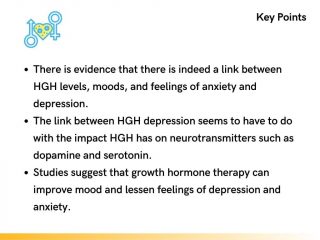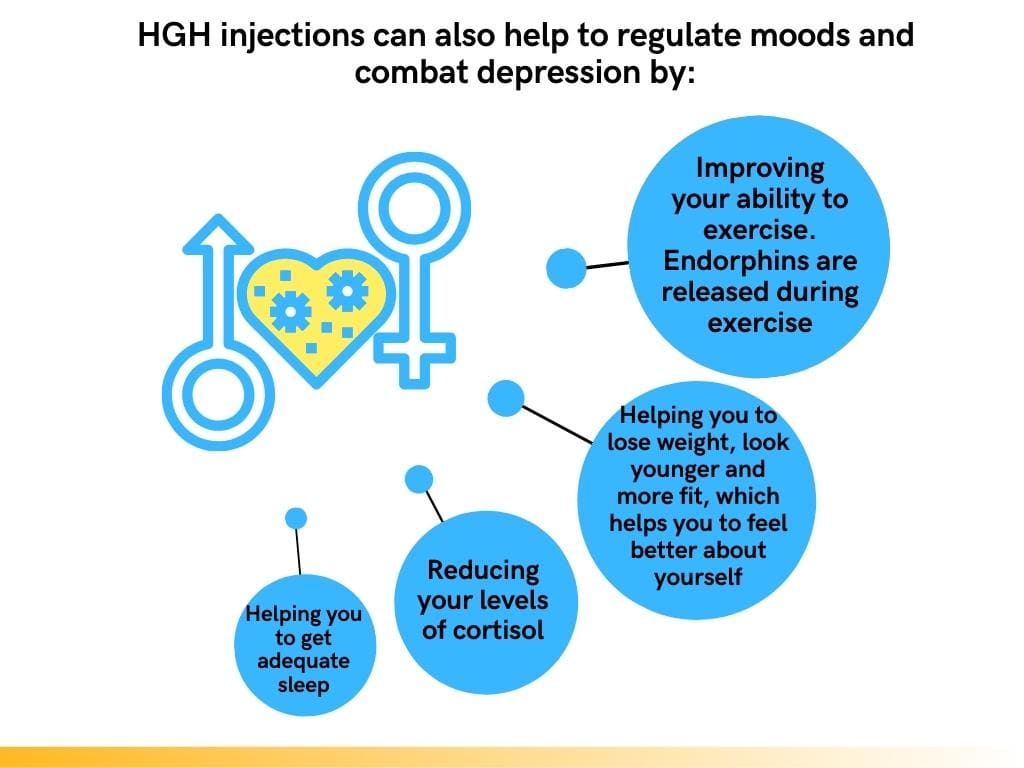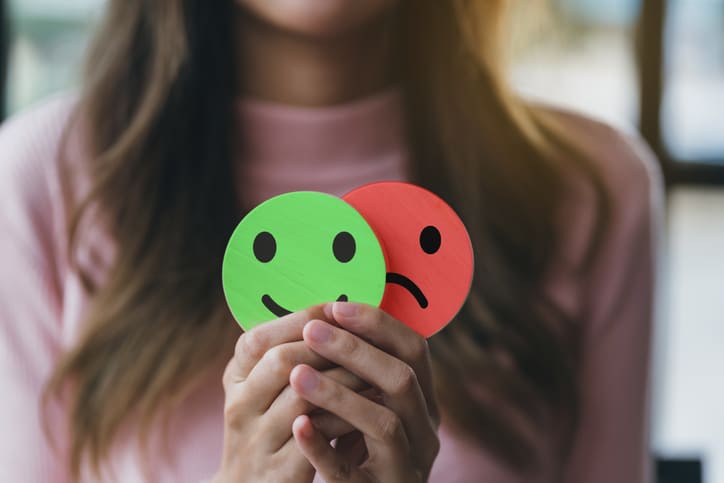HGH and Depression: Unveiling the Connection

There is a definite link between human growth hormone (HGH) mood and emotional states. One of the many symptoms of growth hormone deficiency (GHD), even age-related GHD, is mood swings and depression. One of the many benefits of growth hormone therapy for patients who have been diagnosed with GHD is a reduction in feelings of anxiety and depression.
Let’s take a closer look at the connection between HGH and depression.
Introduction
In addition to having a positive impact on your energy level and your ability to build muscle, HGH also has been linked to moods and emotional states. HGH levels decline as you age. This can lead to adult-onset or age-related growth hormone deficiency. Adults who have been diagnosed with low HGH due to age-related growth hormone decline often complain of feelings of depression or increased anxiety. In such patients, growth hormone therapy has been shown to improve mood. This all seems to have to do with two factors, one, adequate growth hormone levels can help to keep brain cells healthy and strong, and HGH has a positive impact on the production and release of “feel good” neurotransmitters such as dopamine and serotonin.
The Impact of HGH on Mood Regulation
Human Growth Hormone (HGH) is a vital hormone produced by the pituitary gland, responsible for stimulating growth and cell reproduction in humans. Beyond its well-known role in physical development, recent research has shed light on the potential link between HGH and mood regulation. Understanding the impact of HGH on mood, particularly its association with depression can provide valuable insights into the complex interplay between hormones and mental health.
The intricate relationship between hormones and mood regulation involves a complex network of interactions within the brain and throughout the body. HGH, being a crucial hormone involved in various physiological processes, has both direct and indirect influences on mood.
One of the primary mechanisms through which HGH has been shown to impact mood is by exerting neuroprotective effects. Studies have suggested that HGH can enhance neuronal survival and protect against damage caused by oxidative stress and inflammation in the brain. By maintaining the health of brain cells, HGH may help optimize neurotransmitter function and promote stable mood regulation.
Furthermore, research suggests that HGH helps to regulate “feel good” chemicals in the brain, such as dopamine and serotonin. Increasing and maintaining serotonin levels of HGH can improve mood. By enhancing the synthesis and release of serotonin or influencing the activity of serotonin receptors, HGH has been shown to lessen feelings of depression and contribute to more positive emotional states.
Research Studies on HGH and Depression
There have been several research studies that provide evidence of a link between HGH and depression. A 2021 study published in Frontiers – Neuroendocrine Science found that patients with a decreased HGH level had significant increases in depressive thoughts as scored by standard tests used to evaluate clinical depression.
A paper entitled Human Growth Hormone In The Treatment Of Biological Depression concluded that “HGH should be considered as a novel approach to treat depression in certain patients.”
A 2001 study found that HGH supplementation can improve the quality of life in elderly patients, including improvements in memory, cognition, and mood.
A 2004 comparative study published in the European journal, Medicina stated, “This study shows that growth hormone replacement improves mood and cognition in adult growth hormone deficient patients.”
Factors Influencing the Relationship Between HGH and Depression
HGH interacts with various other hormones, such as insulin-like growth factor 1 (IGF-1), which plays a crucial role in growth and development. IGF-1 has also been implicated in mood regulation, suggesting a potential indirect link between HGH and mood via IGF-1. The complex interplay between HGH, IGF-1, and other hormones may contribute to mood stability or vulnerability.
Hormonal Imbalances and Depression
All hormones, and not only HGH, play a vital role in moods. Estrogen, progesterone, testosterone, and thyroid hormones all play a role in mood. An imbalance in any one of them can cause changes in mood and depression. When there is an imbalance in hormone levels, it can affect the brain’s chemistry and lead to changes in mood and emotional well-being.
Individual Variations in HGH Response and Mood
Research has found that people have different sensitivities to HGH, and therefore, there are individual variations in HGH and response to mood. In other words, an HGH level that can cause depression in one person may not have the same impact on another. Similarly, it could take different doses of HGH to improve mood in different patients. This is why hormone replacement therapy, such as growth hormone therapy, is prescribed on a very individualized basis.
Medical Approaches to HGH Therapy for Depression
Depression is a multifaceted mental health condition characterized by persistent feelings of sadness, loss of interest, and disturbances in sleep, appetite, and energy levels. Several studies have explored the relationship between HGH and depression and indicate a therapeutic value in the use of HGH for treating depression in patients with growth hormone deficiency and depression.
HGH can directly improve moods and combat depression by enhancing serotonin levels and keeping brain cells healthy. However, these are not the only ways that HGH injections affect mood and mental health. HGH therapy is designed to bring all of your critical hormones back into balance, which helps to stabilize moods.

Complementary Strategies to Support HGH Production and Mental Well-being
Because there is a known link between HGH and depression, if you take measures to keep your HGH levels high, it may help improve mood and stave off feelings of depression. You can boost your HGH levels by:
- Doing regular exercise, particularly strength training.
- Getting enough sleep.
- Not smoking.
- Reducing your consumption of alcohol.
- Eating a healthy balanced diet.
In addition, you can help to combat depression by:
- Formulating and maintaining good relationships and a social support system.
- Having a regular daily routine.
- Practice some kind of stress reduction.
- Develop and do hobbies you enjoy.
- Do not abuse drugs or alcohol.
- Talk to a counselor if you cannot free yourself of negative thoughts.
Seeking Professional Guidance and Support

It’s important to seek professional help for depression when you experience persistent symptoms that significantly affect your daily life, relationships, work, or overall well-being. Here are some indications that it may be time to seek professional assistance:
- Persistent feelings of sadness, emptiness, or hopelessness that last for two weeks or longer.
- Loss of interest or pleasure in previously enjoyed activities.
- Significant changes in appetite or weight.
- Sleep disturbances, such as insomnia or excessive sleeping.
- Fatigue or loss of energy.
- Difficulty concentrating, making decisions, or remembering details.
- Feelings of guilt, worthlessness, or excessive self-criticism.
- Recurrent thoughts of death or suicide or suicidal behaviors.
Psychological Support for Depression

If your feelings of depression can be linked to growth hormone deficiency or some other hormone imbalance, then hormone replacement therapy may help. But, if there is not a hormonal component to your depression, treatments may include:
- Therapy or counseling: Talk therapy, such as cognitive-behavioral therapy (CBT) or interpersonal therapy (IPT), can help individuals identify and address negative thought patterns, develop coping strategies, and improve problem-solving skills.
- Medication: Antidepressant medications may be prescribed by a psychiatrist or other healthcare provider to help manage depressive symptoms. It’s essential to work closely with a medical professional to find the right medication and dosage for your specific situation.
- Lifestyle changes: Adopting healthy habits, such as regular exercise, a balanced diet, sufficient sleep, and stress management techniques, can have a positive impact on mood and overall well-being.
It’s crucial to remember that treatment approaches may vary depending on the individual, the severity of the depression, and other factors. A mental health professional will work closely with you and your primary care physician to develop a personalized treatment plan that suits your needs and goals.
Conclusions
The relationship between HGH and depression and mood is as complex as human emotions itself. There is evidence to indicate that a link between HGH and depression exists, but if you have ongoing feelings of depression, there could be any number of physical or psychological causes. If you have depression that lasts more than a few weeks – particularly if these include suicidal thoughts – it is important that you see your doctor.

